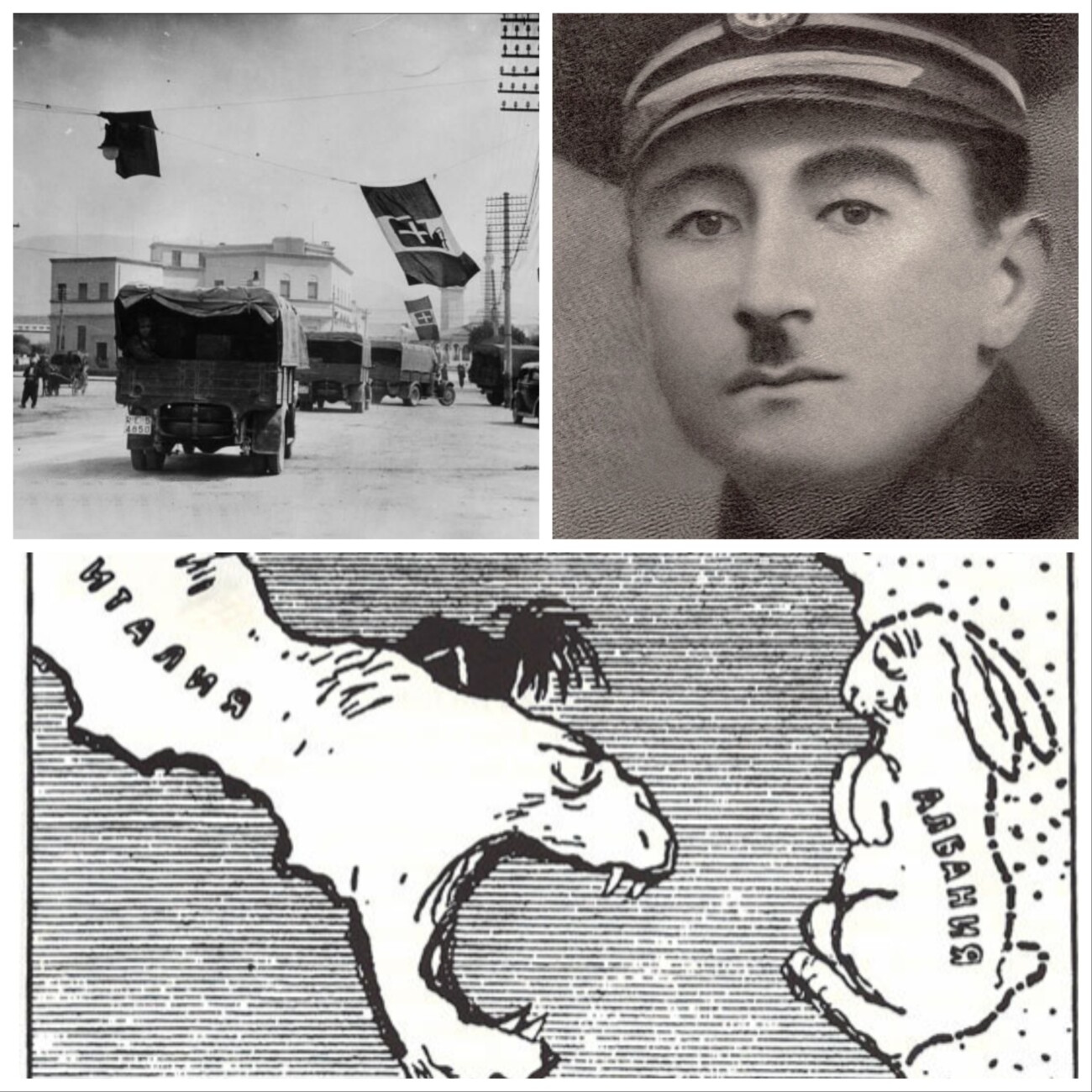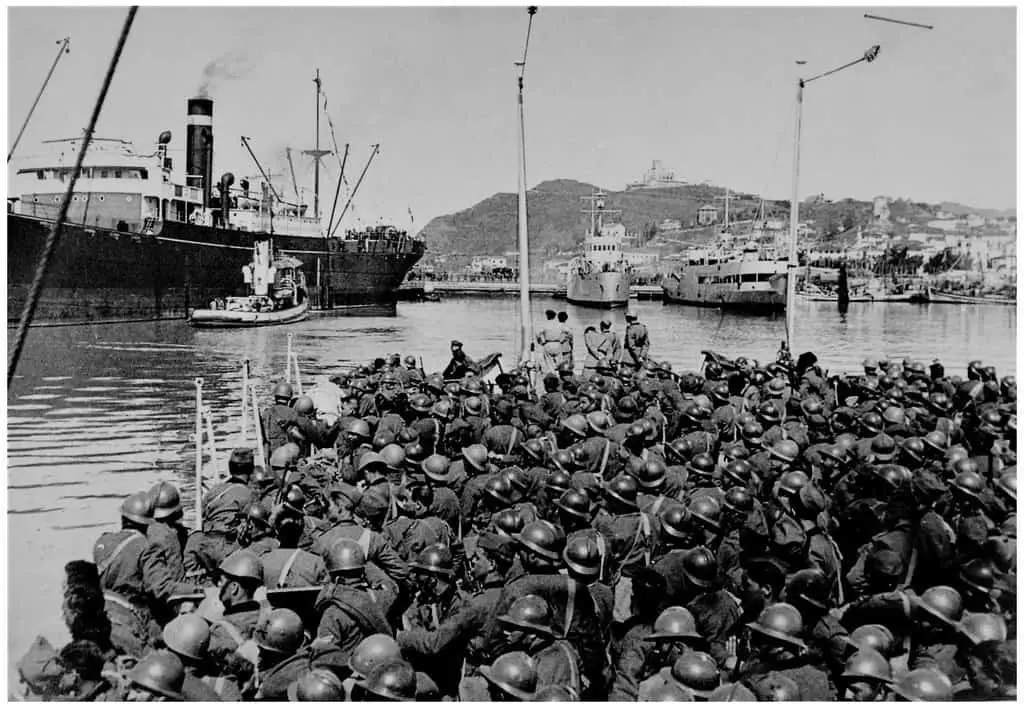Interpretations of Albania’s April 7th Invasion


Figure 1. A collage of pictures depicting the Italian invasion of Albania:
1.1 Italian Army enters Tirana, April 8th, 1939.
1.2 Mujo Ulqinaku.
1.3 A Propagandistic Sketch of Italian Invasion of Albania, published in the Soviet Union in 1939.
Sources: Wikimedia Commons.
Introduction
The invasion of Albania by Fascist Italy on April 7th holds multifaceted significance within the broader context of World War II’s prelude. Concurrent with pivotal global events such as the Nazi invasions of Austria and Czechoslovakia and the Imperial Japanese incursions into China and Mongolia, Albania’s invasion intersects with diverse interpretations across historical narratives and political ideologies.
In Communist Albania, the invasion was attributed to Ahmet Zogu’s “fascist” dictatorship, while others attribute it to Mussolini’s imperialism. Greek historiography views April 7th as the beginning of “War Law” between Albania and Greece. This study explores the diverse interpretations of Albania’s April 7th invasion, revealing varied historical perspectives and ideological influences.

The Genesis of April 7th 1939
Albania’s strategic significance for Italy’s imperialist objectives, highlighted by Seton-Watson, prompted its transformation into an Italian protectorate by 1926. Although Italy achieved irredentist claims to regions such as Trentino and Trieste, its aspirations in Dalmatia encountered challenges. The 1939 invasion of Albania cemented its status as a colony.

During this period, Mujo Ulqinaku, Abaz Kupi, Hamit Dollani, and Ismail Reci played crucial roles. They quickly organized a modest resistance movement that effectively repelled half of the Italian army deployed in Albania. This outcome contradicted the initial predictions of General Alfredo Guzzoni and Alberto Pariani, who anticipated a swift conquest within 24 hours. Instead, the invasion persisted until April 14, 1939, expanding to the northeast region with the capture of Kukes.
Deciphering Time: Unraveling the 7th April in Communist Albania
During the Communist regime in Albania (1944-1990), blame for the invasion was placed not only on Benito Mussolini’s imperialist policies but also on Ahmet Zogu, the former president (1925-1928) and later king (1928-1939) of Albania. A 1979 Communist documentary titled “Lufton djali, lufton plaku, lufton Mujo Ulqinaku” (“The boy fights, the old man fights, Mujo Ulqinaku fights”) alleged that Zogu displayed indifference towards the invasion, misappropriated Albanian national funds, and fled into exile in Greece with his family and several ministers.
Following Ahmet Zogu’s departure from Albania, Communist narratives depicted him as a saboteur and collaborator with the Fascist Italian regime, deviating from an accurate portrayal of his political affiliations. Enver Hoxha specifically targeted him for prosecution. Additionally, despite hints of potential collaboration between Albanian communist factions, including Enver Hoxha, and nationalist groups or Zogu supporters for resistance efforts, such cooperation never materialized.
In Durres, where the Albanian resistance exhibited pronounced fortitude, a monument was unveiled by the communist regime of Albania following four decades of warfare. However, notable omissions persist in the documentation of names. Names such as Abaz Kupi or Luan Pustina are missing in the statue of Mujo Ulqinaku due to the modern influence of Albanian historiography with the communist one.
Deciphering Time: Unraveling the 7th April Across Diverse Historiographical Perspectives
Following the fall of communism in Albania in 1990, there was a rejection of myths perpetuated by communist historiography. Argumentum Newspaper highlighted the Italian invasion of Albania as a memorial day, attributing it to Mussolini’s imperialistic policies. As of April 7, 2024, the debate continues over Ahmet Zogu’s loyalty during Italy’s occupation of Albania.
Foreign observers observed Greece framing the invasion of Albania as the initiation of a “War Law”. Post-World War II, at the Paris Peace Conference, Greek Prime Minister Tsaldaris aimed to occupy South Albania, falsely claiming Italian occupation pre-1939. Presently, Greek distortion of Albanian history maintains tensions in Greek-Albanian relations, compounded by issues such as Greek soldiers’ graves in South Albania and the Cham Genocide Question. Despite NATO and EU memberships, tensions persist.
Conclusion
In summary, the Italian invasion of Albania holds significant historical importance, but it is prone to misinterpretation by various historiographies, including communist Albanian, modern Albanian, and Greek narratives. Unresolved questions persist regarding Ahmet Zogu’s true role in the events of 1939’s Black Friday, Greece’s intentions, and the accurate portrayal of involved actors in the conflict.
The Italian invasion of Albania marks a pivotal moment in Albanian history, heralding the start of World War II in Southeast Europe. Contrasting responses to Mussolini’s aggression toward Albania highlight differences with Austria and Czechoslovakia’s reactions to Hitler’s intentions, as well as China and Mongolia’s responses to Imperial Japan’s intentions. Ongoing historical conferences on April 7th offer a chance to address unresolved questions and clarify historical ambiguities in Albanian historiography.




